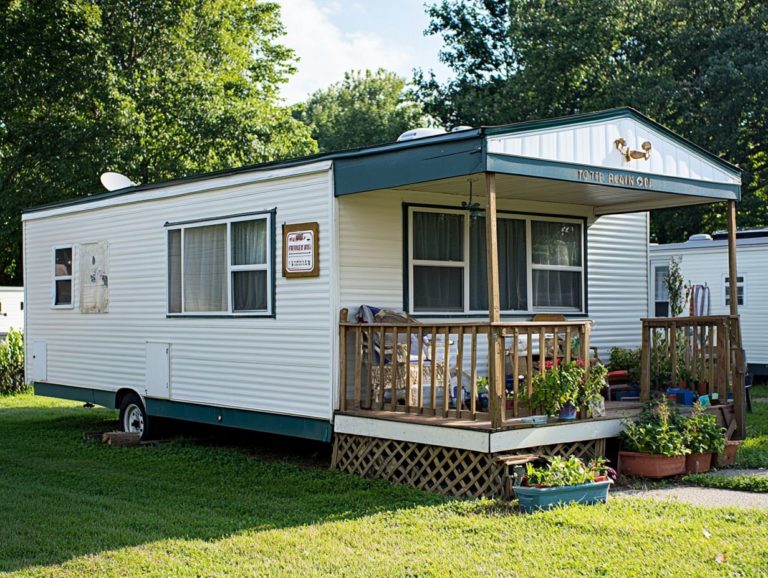Top Considerations for Home Insurance Types
Home insurance serves as a vital safeguard for homeowners, offering peace of mind against life s unexpected twists and turns.
Grasping the different types of coverage available from basic plans to specialized policies is essential for identifying the right fit for your situation.
Considerations like location, property type, and budget can greatly impact your selection.
Let s explore the key elements of home insurance, including the amount you pay before insurance kicks in, regular payments, and customer reviews, empowering you to make an informed decision for your property.
Contents
- Key Takeaways:
- Understanding Home Insurance
- Types of Home Insurance
- Factors to Consider When Choosing Home Insurance
- Considerations for Home Insurance
- Frequently Asked Questions
- What should I consider when choosing home insurance?
- How can I determine the right amount of coverage for my home insurance?
- What is the difference between replacement cost and actual cash value for home insurance?
- Are there any discounts available for home insurance?
- What is the best way to compare home insurance quotes?
- Do I need separate insurance for natural disasters?
Key Takeaways:

Consider the location and type of property when choosing home insurance to ensure adequate coverage and protect your investment.
Understand the difference between basic and comprehensive coverage, as well as specialized policies for specific needs, to choose the right type of insurance for your home by understanding the limits of home insurance types.
Review deductibles, policy limits, and customer reviews to make an informed decision on home insurance that fits your budget and provides sufficient protection for your home.
Understanding Home Insurance
Understanding home insurance is essential for you as a homeowner. It acts as a financial safety net against unexpected events that can harm your property or belongings.
Home insurance offers a range of coverage options, ensuring you are protected from potential losses. This includes damage to your dwelling and personal property, as well as liability coverage in case of accidents.
Choosing the right policy from a reputable insurance company is vital to safeguarding your investment and providing you with peace of mind.
What is Home Insurance?
Home insurance, often referred to as homeowners insurance, is a policy crafted to protect your home and personal belongings against various risks and liabilities. This type of insurance plays a vital role in safeguarding your living space from unexpected events, whether it’s a natural disaster, theft, or other forms of damage.
It usually includes dwelling coverage, which assists with the costs associated with repairing or rebuilding your home, as well as personal property coverage that shields your valuables think furniture, electronics, and clothing.
Liability coverage offers financial protection should someone sustain an injury on your property, covering legal expenses and medical bills.
By investing in home insurance, you gain the peace of mind that comes from knowing your cherished possessions and assets are protected from unforeseen circumstances.
Types of Home Insurance
Let’s look at the different types of home insurance for first-time buyers available to you. When diving into the world of home insurance, it’s crucial for you to grasp the array of policy options at your disposal, from HO-1 to HO-8.
Each policy is meticulously crafted to address distinct coverage needs and property types, ensuring that you find the perfect fit for your circumstances.
Basic Coverage vs. Comprehensive Coverage
Understanding the distinction between basic coverage and comprehensive coverage is essential for you as a homeowner aiming to secure your property effectively.
Basic coverage typically provides essential protection against common threats like fire, theft, and vandalism, but it often leaves significant gaps when it comes to more severe events.
Comprehensive coverage offers a broader safety net, protecting you against a wider array of risks, including natural disasters such as floods or earthquakes depending on the specifics of your policy.
It’s crucial for you to be aware of potential exclusions within these policies, which may include certain types of damage or specific situations that might not be covered.
Choosing the right level of protection requires you to assess your individual circumstances, such as your property’s location, age, and your financial situation, ultimately ensuring you have peace of mind in the face of unexpected mishaps.
Protect your home today with the right insurance; you never know what tomorrow may bring!
For personalized assistance, consider consulting an insurance agent to assess your home insurance needs and learn what to know before buying home insurance.
Specialized Policies for Specific Needs

Specialized policies like renters insurance and landlord insurance meet your specific homeowner needs. They offer tailored coverage for different living situations.
For example, renters insurance protects your belongings from theft or damage. It also provides liability coverage if someone gets injured in your rental.
Landlords benefit from landlord insurance, which protects their rental properties from unexpected hazards. If you own a historic home, specialized policies can address your unique restoration needs.
Both renters and landlords can secure additional living expenses coverage. This ensures you are protected during repairs after unexpected damage.
Factors to Consider When Choosing Home Insurance
When choosing home insurance, think about your location, property type, budget, and coverage needs. To make an informed decision, consider understanding the differences in home insurance types, as this will help you find a policy that fits perfectly.
Location and Property Type
Your location and property type greatly impact your home insurance, influencing the risks and coverage limits of your policy. For landlords, understanding what to know about landlord insurance types is crucial for adequate protection.
Different areas have unique challenges and risks. For instance, if you live in a flood-prone zone, expect higher premiums due to the increased risk of water damage.
If you live in an earthquake-prone area, you might need extra coverage for those specific risks.
The type of structure you own, whether it’s a single-family home, condo, or older building, also influences your options. Understanding the types of home insurance coverage is essential, as insurers assess these factors to ensure you’re protected from potential hazards.
Budget and Coverage Needs
Finding a balance between your budget and your coverage needs is crucial. This balance directly affects your premiums.
Consider your property value, existing assets, and any dependents, such as family members or pets. Understanding potential risks can provide valuable insights.
Evaluate your financial situation and how much unexpected costs you can handle. This helps you determine the right amount of coverage without straining your finances.
A thoughtful approach leads to a policy that balances strong protection with affordable premiums.
Considerations for Home Insurance
Your considerations for home insurance go beyond just picking a policy. You need to understand deductibles, premiums, policy limits, and what to look for in home insurance coverage during the claims process.
Knowing these details allows you to make informed decisions that meet your needs and expectations.
Deductibles and Premiums

Deductibles and premiums are key players in home insurance. They shape your finances and dictate your coverage choices.
A deductible is the amount you ll need to cover out of pocket before your insurance steps in for a claim, while premiums are the regular payments that keep your coverage active. Generally, choosing a higher deductible can lead to a lower premium, which may be enticing if you’re aiming to trim your monthly expenses.
You should also strike the right balance; choosing a particularly high deductible could expose you to financial strain should a substantial claim arise. To navigate this effectively, compare multiple quotes and carefully weigh various combinations of deductibles and premiums that align with your budget while ensuring you secure adequate protection against potential risks.
Policy Limits and Exclusions
Understanding policy limits and exclusions is essential for you as a homeowner to ensure that you have the right coverage for your valuable possessions.
Review your insurance documents carefully. Understanding limits and exclusions will help you avoid unexpected costs. Being aware of these factors not only protects you from unforeseen financial burdens but also ensures that the necessary safety nets are in place when disaster strikes.
For example, if an unforeseen event occurs that falls outside the specified coverage, you could find yourself in a difficult position without any support. By staying vigilant and informed about what is covered and what isn t, you can better protect your assets and achieve a sense of peace of mind.
Customer Reviews and Ratings
Don t overlook customer reviews; they can be a game changer in choosing the right insurance provider. Customer reviews and ratings are vital in evaluating the reputation of insurance providers and the quality of their customer service.
As you consider an insurance provider, taking a deep dive into customer feedback can unveil patterns in service delivery that significantly influence policy satisfaction. Pay particular attention to how a provider guides clients through the claims process; delays or poor communication can lead to frustration and disappointment.
By analyzing reviews, you can assess not only the product offerings but also the overall experience during critical moments, enabling you to make informed decisions that align with your needs.
Frequently Asked Questions
What should I consider when choosing home insurance?
The top considerations when choosing a home insurance type are the coverage options, deductibles, premiums, reputation of the insurance company, and understanding homeowners insurance types specific to your needs or risks associated with your home.
How can I determine the right amount of coverage for my home insurance?

The right amount of coverage for your home insurance can be determined by evaluating the value of your home, its contents, and any potential risks or hazards that may require additional coverage.
What is the difference between replacement cost and actual cash value for home insurance?
Replacement cost coverage will reimburse you for the full cost of replacing damaged or destroyed items in your home, while actual cash value takes into account depreciation and will only reimburse you for the current value of the item.
Are there any discounts available for home insurance?
Yes, many insurance companies offer discounts for things like installing security systems, having a good credit score, or bundling your home insurance with other policies.
What is the best way to compare home insurance quotes?
The best way to compare home insurance quotes is to gather quotes from multiple insurance companies and carefully review the coverage options, deductibles, premiums, and any additional factors that may affect the cost or coverage of the policy.
Do I need separate insurance for natural disasters?
Your need for separate insurance depends on where you live and the risks of natural disasters in that area.
Some home insurance policies cover specific natural disasters. Others may require you to buy extra protection.
Review your policy closely. Don t hesitate to ask your insurance provider any questions you have.






